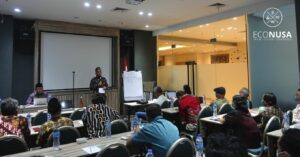
Management of territorial waters based on local wisdom is one method of maintaining the sustainability of natural resources in the Land of Papua. This practice has been going on for a long time and has been passed down from generation to generation. Long before the concept of conservation became widely known in the academic world, indigenous peoples had treated the environment around them wisely.
There are various conservation practices based on local wisdom. You name it, Sasi in Sulawesi and Maluku, Lubuk Laral Ngalau Agung in West Sumatra, Tiyaitiki in Jayapura Regency, and Sasisen in Biak Numfor Regency. These local wisdom practices prohibit community members from entering an area and utilize the resources within it for a certain period of time. This was also done by the Marori Men Gey Tribe in Wasur Village, Merauke District, Merauke Regency, Papua Province, which is known as Sar.
In contrast to other local wisdom practices, Sar is done as a symbol of respect for relatives or families in the Marori Men Gey Tribe who have died. In practice, Sar is a ban on the use of fishery resources in rivers or swamps for 1,000 days.
Norce Mote and Agustinus Mahuze, through the ‘Sar’ Local Wisdom in Preserving Fish Resources in the Men Gey Marori Tribe, Wasur Village, Merauke Regency, stated that Sar had a procession which was carried out in several stages. The first ritual in the Sar procession is called wuyuw. The grieving family is wearing a bracelet as a sign of starting the week-long abstinence ritual. In the local language, people call the bracelet ureuw.
Of the several stages, there are several things that can be explained, such as abstinence rituals. This ritual begins with a promise to carry out abstinence in the grave of a family who has passed away. Early abstinence is carried out after 40 days of mourning, by not eating fish or meat associated with totem family members. On the same day, the family will install a prohibited timber (yarauw) to catch fish in the agreed river or swamp. This procession is called yemu.
On the way home after saying the promise, another ritual that must be carried out is terpenjeuw. The family sows leaves to cover the tracks of family members who have passed away. It is intended that the family affirm the departure of family members who have died.
After a week ago, the bracelet or ureuw is released by holding a ritual. Family members who are still alive are in charge of preparing food and drinks that are pre-arranged. The bracelet release ritual was carried out in the grieving family home.
Garden products, such as bananas, sugar cane, betel nuts, betel nuts, etc., become customary goods that have been agreed to be provided in the ritual of releasing bracelets. Sago and other tubers are traditionally processed using the stone burning method. This procession is known as sep. the family wearing the bracelet sits in a circle during the sep ritual.
Before removing the bracelet, the family prepares a coconut. Then the coconut is split as a symbol of the end of abstinence. Coconut water is then sprinkled around family members. Then, each family member tasted the agreed upon taboo. This procession is carried out alternately. One family member is in charge of giving dishes that are challenged to other family members.
“The food in this ritual varies, depending on what is displayed. For example, related to native fish and fish that are often eaten by people who died or food and drinks that people liked during his lifetime, “wrote Norce and Augustine.
A week after the procession of releasing the bracelet, the family returned to sowing the leaves in a place where a family member who had passed away had passed, such as in the forest, swamp, or a place of work.
The next procession is called ureuw wogib. The rope that is used when carrying out abstinence is stored in the sago or swamp forest that has been agreed as the Sar place. In this procession, only certain family members are appointed to keep the rope and do not involve other Marori.
The last procession is a traditional party yarauw onggi. This party marks the lifting of the ban on taking fishery resources for 1,000 days or called yarauw onggi. Timber that is a symbol of the prohibition will be revoked.
There are no severe sanctions for someone who violates Sar. Sanctions are given only in the form of reprimands or obligations to meet the needs needed at the yarauw onggi traditional party. For example by donating bananas, tubers, sago, or animals.
According to Norce, the implementation of Sar provides time for fish to breed. “They (fish) are allowed to grow in nature without human interference. Nature will do the selection itself. Management based on local wisdom like this is quite good, “Norce said when contacted by EcoNusa.
In addition to the application of Sar, the sustainability of fisheries resources is maintained by the application of fishing areas. Norce said that each clan has customary rights to utilize fishery resources in certain locations. “Other clans cannot enter into customary rights that are not theirs. If you enter, customary sanctions will be imposed. So besides Sar, they still maintain the integrity of their customary rights, “said Norce.
Editor: Leo Wahyudi







